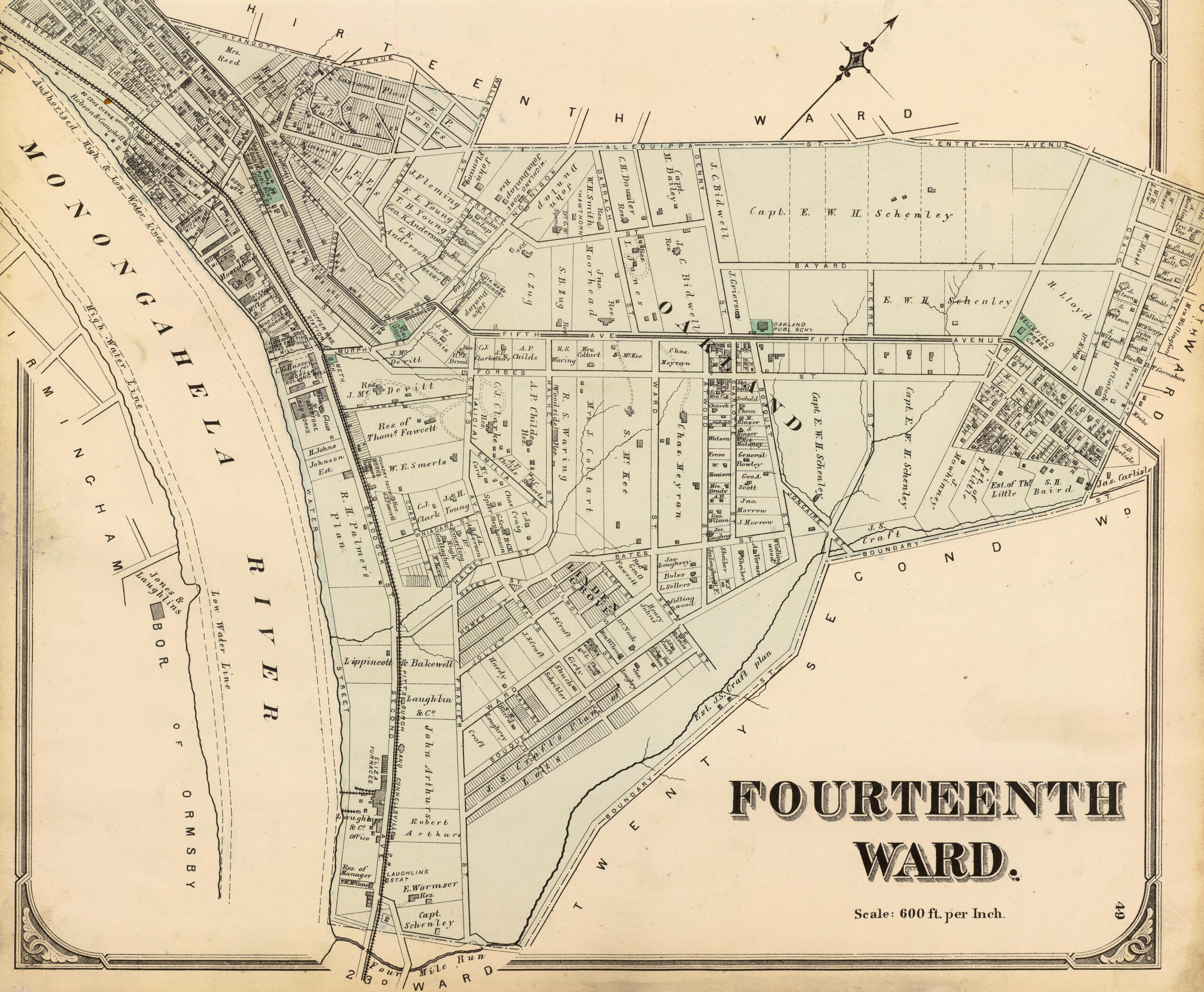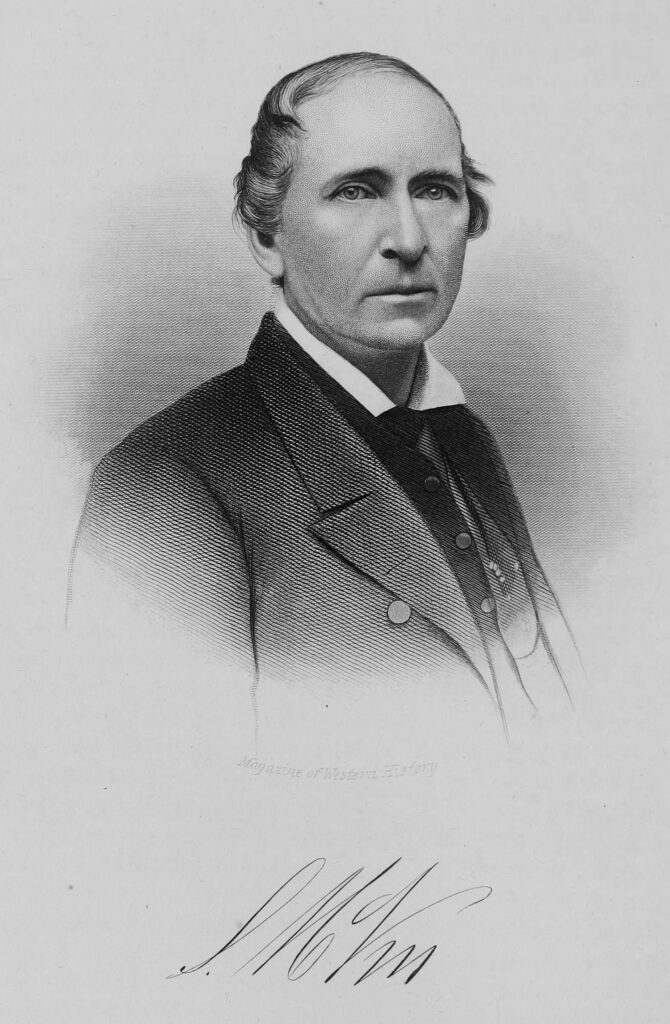
Samuel McKee was born in March 29, 1808 to Daniel and Mary Stewart McKee (d. 1841), who married in Cumberland County, Pennsylvania. After his father Daniel’s death, they move to Pittsburgh.
During a speech at the ceremony marking the laying of the cornerstone for the McKee Memorial Cottage in Lancaster, Frederick C. McKee, grandson of the founder of McKee & Bros., Frederick, provided some insights regarding the relocation to Pittsburgh.
“About the year 1810, a pioneer mother, Mary Stewart McKee, whose husband had died, near Landisburg, Pennsylvania, started over the Allegheny Mountains with her six boys, in a Conestoga wagon.”
His brothers included Thomas (b. 1800 d. 1864), James (b.1805 d. 1884) and Daniel (d. 1844). Some records indicate that he worked for Charles Ihmsen who dies in 1928. Charles Ihmsen was a glassmaker associated with Wendt, the first glass houses in Birmingham (South Side, Pittsburgh).
Samuel marries Mary Ihmsen, the daughter of Charles Ihmsen, in about 1829. To illustrate how important this union may have been to Samuel’s success, Mary’s brother, Christian Ihmsen, was also a leader in the glass industry.
Their first child Catherine is born the next year and then Willamena, William F., Mary, Samuel A., Phoebe, Daniel, and Christian. Daniel and Christian will end up leading the glass company after Samuel’s death in 1876.
When young Samuel first layed his eyes on Pittsburgh, it was a small borough with a population of 4,768. This compares to New York at 96,373, Philly at 53,722 and Boston at 33,787.
By the year 1826, his mother had relocated to Birmingham, a borough situated across the Monongahela River, which had a modest population of just 459 residents and comprised 65 buildings. This information comes from the 1826 directory published by Samuel Jones.
During this period, they report the following glass factories:
– Pittsburgh Glass Works: Established in 1797 on the south side of the Monongahela River, directly across from the Point. It was originally owned by F. Lorenz and was previously the factory of General O’Hara and Major Craig.
– Bakewell, Page & Bakewell Glass House: Constructed in 1811 at the intersection of Water and Grant Streets.
– Birmingham Glass Works: Founded in 1812 at Center and Neville Streets in Birmingham by Beltzhoover, Wendt & Co., later becoming Sutton, Wendt & Co., and managed at the time of publication of the direcoty by Wendt, Encell, Impson & Company.
– Stourbridge Glass Works: Built in 1823 at the junction of Ross and Second Streets by John Robinson.
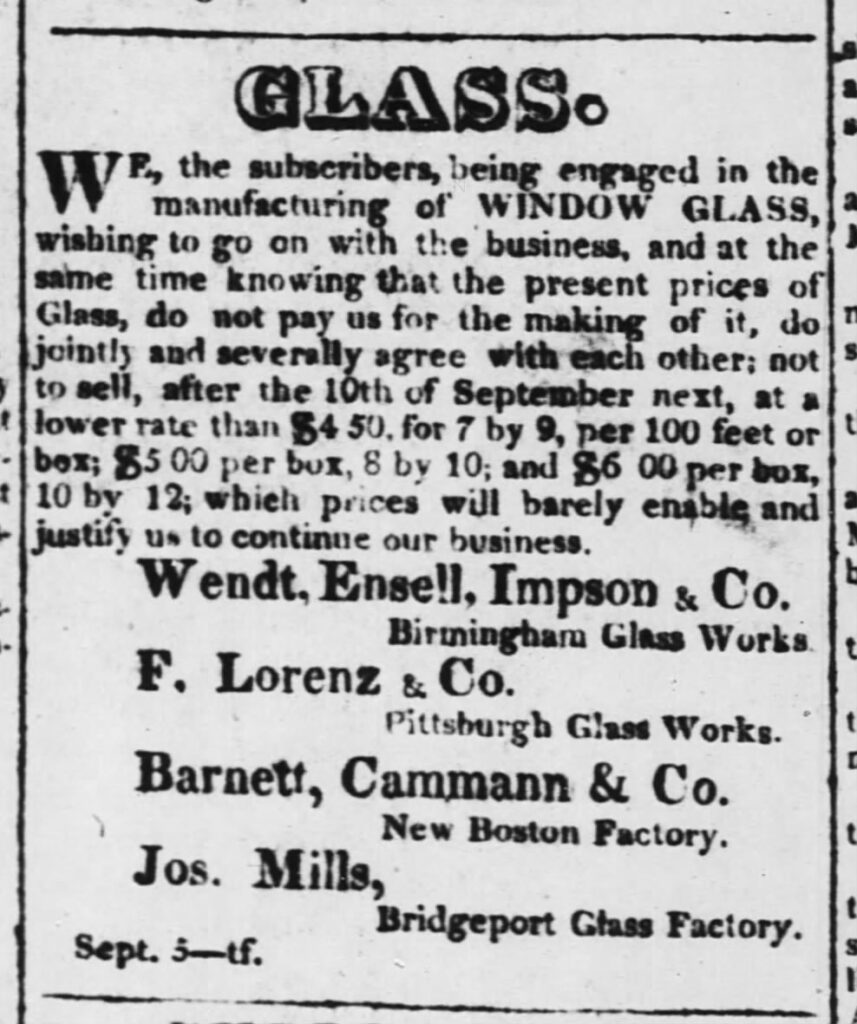
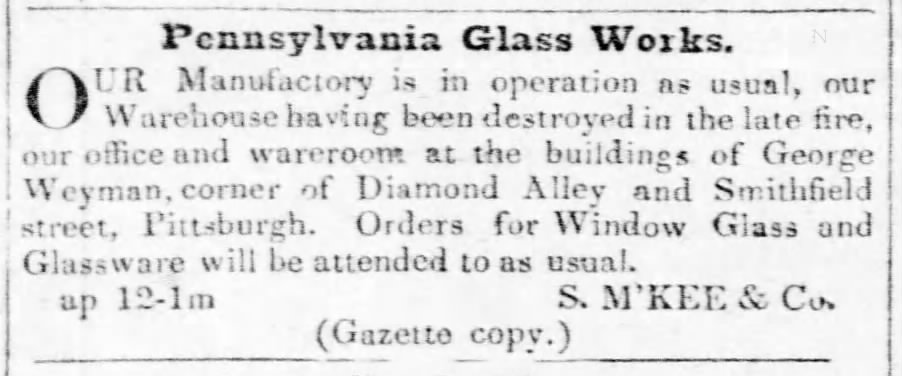
By the time Samuel started his glass house in 1837, many more glass houses had sprung up. He formed S. McKee & Co., also known as Pennsylvania Glass Works, with his brother Thomas and James, who also operated a dry goods store at the corner of Denman, now 12th St., and Carson Streets in the borough of Birmingham.
As was the fashion of the time, he also had his warehouse and offices on the other side of the Monongahela “Mon” River in the borough of Pittsburgh on Water St.
In terms of timing, they began their business the same year as the onset of the Great Panic, which lasted until the mid-1840s. Through this economic downturn, Samuel finds a footing in politics and becomes the Burgess of Birmingham in 1841. That same year, on June 14 1841, his mother Mary dies at 66.
In 1844, his brother Daniel McKee, a carpenter by trade, dies. He leaves a wife Louisa, son Washington and daughter Charlotte with his brothers John and Thomas appointed as executors of the estate.
The next year, another event that impacts all of Pittsburgh, the Great Fire of 1845. It destroys much of the burrough of Pittsburgh, including the warehouse and offices of S. McKee.
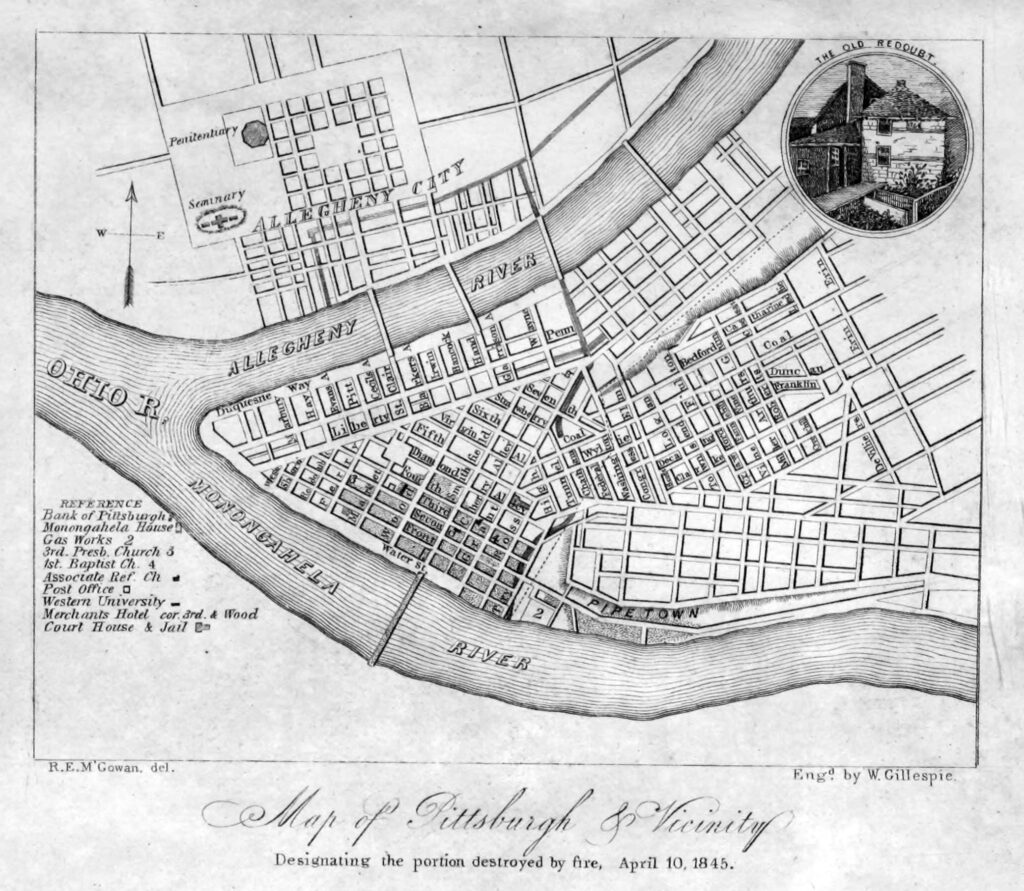

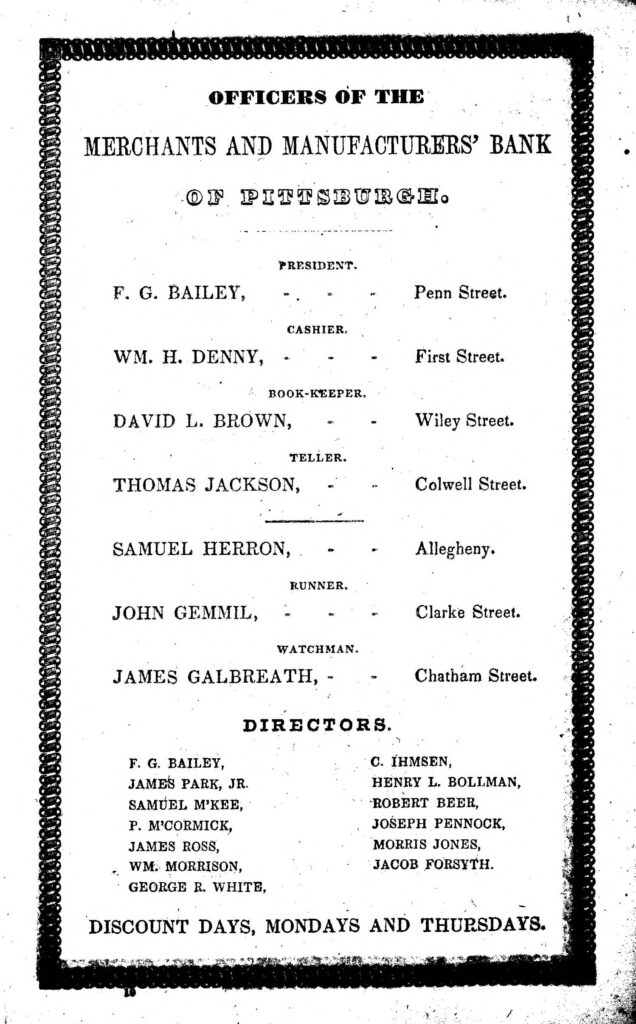
In 1850, an entry in Fahnestock’s Pittsburgh Directory identifies Samuel McKee as a director at the Merchants and Manufacturer’s Bank of Pittsburgh, alongside his brother-in-law, Christian Ihmsen. By 1863, Samuel McKee also held the position of Director at the Monongahela Water Works.
The year 1864 turned out to be particularly tragic for Samuel. On April 11, his son, Captain Samuel A. McKee, was shot by a guerrilla in Virginia and succumbed to his injuries the next day at the young age of approximately 23. Later that year, Samuel’s brother, Thomas, passed away on June 2. Then, on July 5, Samuel faced a severe accident when he was struck by the wheels of the East Liberty Passenger Railway while attempting to board the car, which suddenly moved forward. As a result, he sustained a broken leg and arm, along with internal injuries. This was also the year he relocated from Birmingham to an estate that would eventually be known as McKee Place—truly a year filled with hardships.
In 1867, changes took place within S. McKee & Co. as the partnership between Samuel McKee, William F. McKee, and Robert Wallace came to an end. Robert Wallace, his son-in-law through his marriage to Samuel’s eldest daughter, Catherine Lorenz McKee, dies unexpectedly in 1869 at 42 of cholera.
On September 25, 1873, Samuel’s son William F. McKee passed away at the age of 35 due to a chronic illness. Samuel dies a few years later in 1876 at the age of 68.
In 1885, we see the first 60 feet of McKee Place, at first named McKee St, being approved for construction, from Forbes to Fifth Streets. In 1889, an ordinance approves the road that would run from Forbes to Bates Streets.
The firm is carried on by his two sons Daniel and Christian as well as his son-in-law A.C. Dravo after Samuel’s death. In 1890, A.C. Dravo leaves the partnership. In 1903, Christian passes at the age of 48 and in 1904 the company becomes insolvent. Daniel dies on Dec 2, 1913.
A wonderful passage in the Magazine of Western History, v.3 (1885/1886) by William W. Williams recounts the life of Samuel McKee:
“Mr. McKee’s whole life was characterized by an unflinching integrity of purpose and action, and to this and to his remarkable business qualifications was due his great success. Notwithstanding his close attention to business, he found time to indulge a fine taste for literature, and there were few men in Pittsburgh or elsewhere better read in some directions than he. He was domestic in his tastes, fond of home life, and true and honest-hearted in every relation of life. He was respected by the entire community, and in his long and busy career no one ever questioned his personal integrity or commercial honor. His business led him into relationships with men and firms the country over, and with them all his word was taken at its full meaning, and the deed was found always to be as good as the word.”
